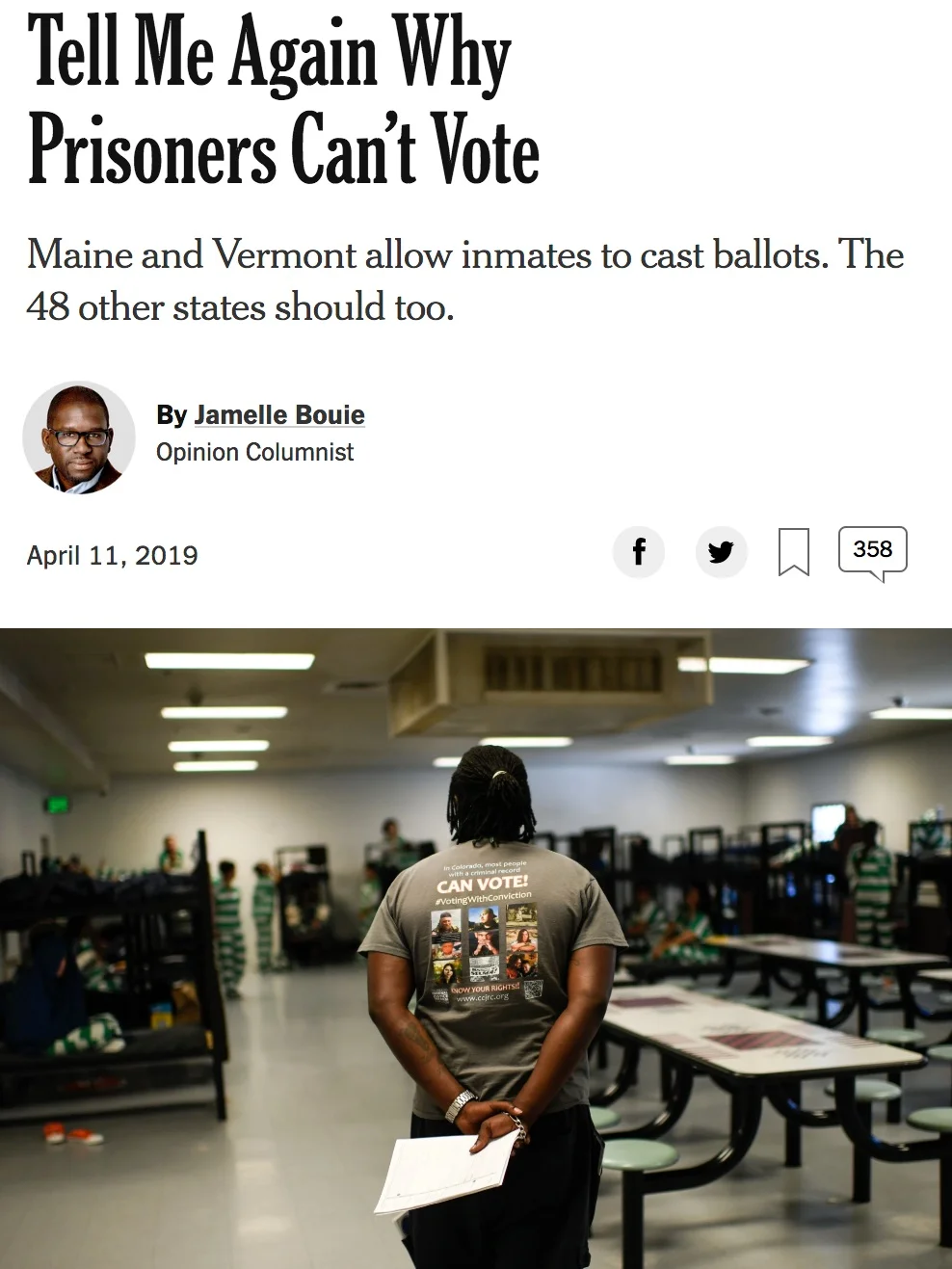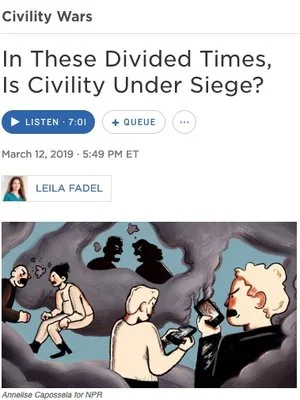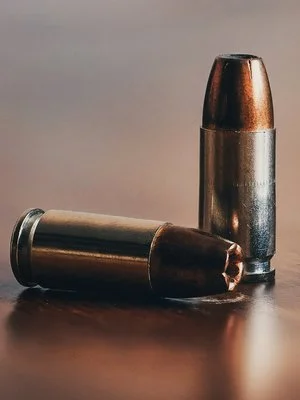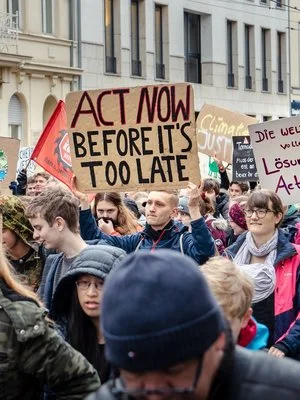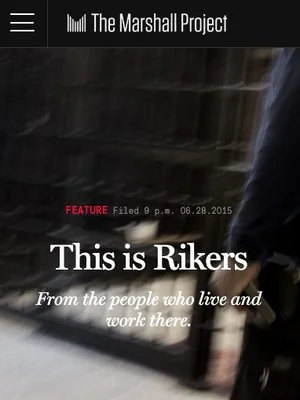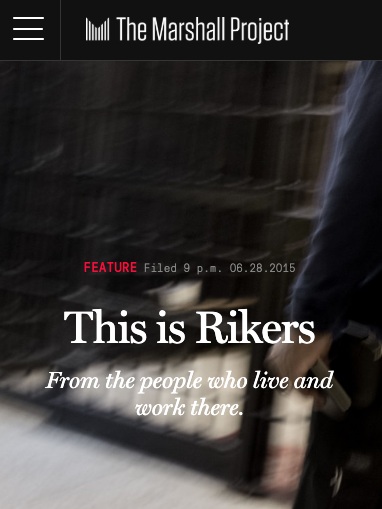It’s June first, and even though Summer doesn’t technically start until later this month, we’re loving this wave of beautiful weather and summer vibes flowing through New York City. In celebration of the season, these five writers shared memories of summers they’ll never forget. Stroll down memory lane with these stories at www.nytimes.com.
Voting rights are slowly being restored to former inmates across the country. In 2016, an estimated 6.1 million citizens were kept from the ballot box for the presidential election because of their criminal record. There is a growing consensus among democrats that these citizens should be given their right to vote. Another point to consider is - should current inmates be allowed to vote? We enjoyed reading this Op-Ed by Jamelle Bouie in the New York Times. He raises some important points worth considering when it comes to inmates’ rights. Read the full article at www.nytimes.com.
With all of the frustrating delays and interrupted service, it can be hard to remember how lovely riding the New York City subway can sometimes be. Where else can you see over-sized dogs stuffed into one-of-a-kind carrying cases, or get an impromptu mid-afternoon alien dance recital?Yes, these are both real life examples. We love this collection of weird, uniquely subway moments put together by the New York Times: www.nytimes.com
Photographer Ethan James Green chronicles the “freewheeling Wild West” of young New York. With portraits of new creative renegades flocking to the city, Green’s subjects are often “in states of transition, whether the transition from youth to adulthood or a gender transition…transitions render people vulnerable, but Green’s subjects are confidently beautiful, masters of style and attitude.” Read more and see his photographs at www.newyorker.com.
When people are struggling, the best thing you can do is ask them what can be done to help. That’s exactly what the American Cancer Society did with this study that researched what breast cancer patients need the most help with when it comes to paying for their healthcare. Read the full story from www.cancer.org.
The new nonprofit storytelling platform A Picture’s Worth gives deeper meaning to photographs by pairing them with audio stories explaining what they mean to the people who select them. It’s a great example of impactful narrative storytelling, connecting the visual with the personal. Learn more at wcpo.com.
Interesting article from NPR, discussing the role fo civility in modern life. Today it seems like civility has gone out the window, especially in politics, but in the past, insistence on civility has also meant the silencing of outrage over injustice. There must be a balance somewhere. Read the full article at npr.org.
This philosophy professor has a message for you: you’re not entitled to your opinion. Patrick Stokes makes the argument that allowing people to simply express their ideas without backing them up can be detrimental to public discourse - especially in an age of fake news and distrust of the scientific community. Read the full article on www.theconversation.com.
This past Friday, Chinese workers who were integral to the completion of the American Transcontinental Railroad were recognized for their work. A ceremony was held in their memory with speeches and a lion dance at the spot where the final spike of the railroad was driven 150 years ago.
Although Chinese workers largely built the railroad that connected this nation (they were about 90% of the workforce), they were barred from citizenship by the 1882 Chinese Exclusion Act. Chinese workers faced labor discrimination, which meant longer hours for less pay than white peers. Cutting across the Sierra Nevada mountain range, the workers completed some of the most dangerous sections of the railroad. It’s believed that hundreds died, but this information was never recorded.
Reading this story, we are reminded of the ways that immigrants have made invaluable contributions to this country, regardless of our government’s choice to grant them legal citizenship or not. Part of doing better for future Americans is to recognize immigrants as a vital part of our economic strength, and to right the wrongs of history by giving them a legal path to citizenship.
To read the full story, visit www.newyorktimes.com.
The Safe Third Country Agreement (S.T.C.A) is an agreement between the U.S. and Canada that prohibits most immigrants who arrive in the U.S. first from making an asylum claim at the border of Canada (and vice versa).
Initially, the agreement was reached based on the idea that both the U.S. and Canada are equally safe countries for immigrants looking to start a new life. It was put in place in part to prevent “asylum shopping” - or “shopping around” at one country before deciding to go to the other. However, now there are legal challenges to the agreement questioning whether the United States truly is a safe place for immigrants.
The mounting evidence makes it clear that the United States government is not capable, or has chosen not to, take seriously the safety of it’s asylum seekers - and that Canada should be able to grant asylum to immigrants who land in the U.S. before making their way up north. It’s a sad reality to face, and we must do better. Read the full story at www.newyorker.com.
Food waste is just part of the larger sustainability issue the United States faces as on of the largest producers of waste. The U.S. restaurant sector generates 18 percent of U.S. food waste, at a cost of roughly $25 billion annually.
Hopefully, American restaurants will start taking notice of their Canadian neighbors in Toronto who are reducing their waste each week (reaching nearly 0 waste), making more money, and creating a fun Sunday night tradition.
Chef Darcy MacDonnell of Farmhouse Tavern in Toronto started the weekly event “F*** Mondays.” The name stems from the dread that comes with either freezing or throwing out food Monday morning after a slow Sunday night dinner service (and the reluctance we all feel about starting the work week). Each Sunday night they serve dishes designed to use excess food from the week, at steep discounts - as much as 50% off. The event creates excitement around the food, since menu items quickly disappear as the night wears on, and leaves the restaurant with an empty fridge to start the new week. It’s a win-win.
To read the full story, visit www.npr.org.
We wish it were easier to photograph with black and white film these days (otherwise, we’d still do it!) It’s amazing to see the side by side comparison of how we take pictures today vs. 68 years ago. These photos show how New York’s iconic landmarks, including Rockefeller Center, Central Park, and St. Patrick’s Cathedral were photographed in 1951 and now in 2019. Maybe one day our smart phones will look as “vintage” as these old-school cameras. See the photo story at www.nytimes.com.
We’re excited to see this new slate of documentaries and films the new production company, Higher Ground Productions, started by Barack and Michelle Obama, are planning for Netflix. The films range from a drama series set in post-World Wall II New York to a film adaptation of the biography “Frederick Douglass: Prophet of Freedom”.
“We believe each of these productions won’t just entertain, but will educate, connect and inspire us all,” Mr. Obama said in a statement.
We can’t wait to see them. To learn more and to see the full list of planned projects, read the full story at www.nytimes.com.
Visual Editor of The New York Times’ style section Tracy Ma talks about two of our favorite things: food and typography. We thoroughly enjoyed this typographical walk through New York’s Chinatown, and learned a lot about the cultural significance of the difference between Simplified Chinese and Traditional Chinese. Speaking about the Chinese diaspora, Ma writes:
“I don’t really know ‘home,’ but I know the longing for it, how it manifests through shared signs and symbols: glass jars with salted plum inside, a character in outlined neon that says ‘Wax.’”
Read the full story at eyeondesign.org.
Survivors of gun violence are often overlooked, leading to a lack of research and understanding about the full impact of gun violence. Though they may have survived, often people’s lives are forever changed, both physically and psychologically. Learn more at www.theatlantic.com.
We need to work on our co-dependant relationship with the digital world - and as the people who build it, it’s up to us to create products that actually serve us. A new proposal for digital design: “There when you need it, invisible when you don’t. It would be much better than what we believe today: There when you need it, incessantly begging you to come back when you don’t.”
Check out this interesting read from medium.com.
This activist lays out the case for not falling for the “find common ground” solution. Sometimes, the challenger you’re facing is so far down the wrong path that meeting them in the middle still means you’re heading down a dark road. Case in point: “Is it more essential that we comprehend the motives of white nationalists, or is it more urgent that we prevent them from terrorizing communities of color and those who oppose racism?” Read the full article at www.time.com.
This article takes a closer look at Rikers Island, from the point of view of the inmates. One inmate describes the isolating, maddening experience of enduring solitary confinement, while others take you through the day to day schedule of their lives. Read the full story at www.themarshallproject.org.
Did you know that there’s a correlation between the divorce rate in Maine and the per capital consumption of margarine in the US? Neither did we. These graphs made us giggle, pointing out that just because data points are correlated, doesn’t mean one caused the other. Check out more weird graphs at www.fastcompany.com.
Last week, Gillette went to bat defending their twitter post showing a plus-size model in a bikini at the beach. After posting, they were immediately bombarded with accusations of promoting obesity and unhealthy lifestyles. Read the comments for yourself, they are brutal.
At the end of the day, a strangers’ health is none of your business. It is between them and their doctor. Since when has shame been a healthy motivator for anything?
Women have always been told that their worth is contingent on the status of their body: can it bear a child? can it do free labor? can it please a man? can it work a 60 hour work week and still look fit, fresh, ready (and smiling) come Monday morning?
Let’s all agree that women’s bodies belong to them - and that their health, appearance, and ability is none of your business. Just let her live, and god forbid, choose to love herself unconditionally.



